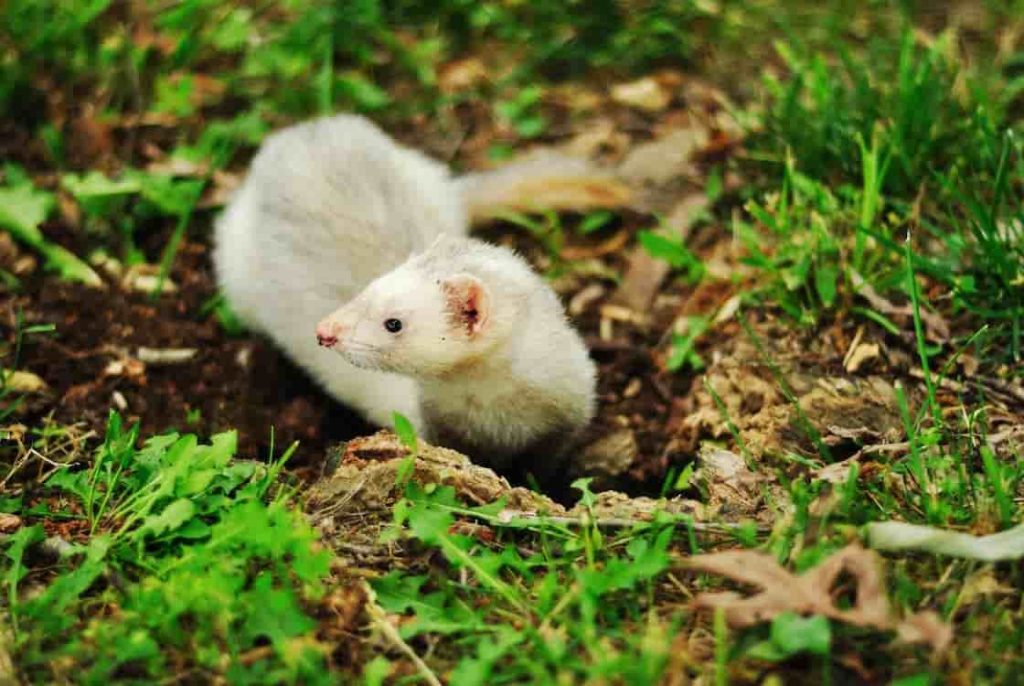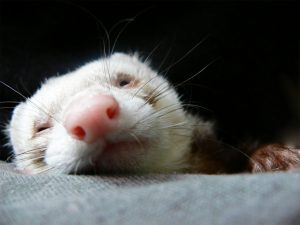Last updated on February 26th, 2023 at 01:45 am

Those planning on getting a pet may be drawn to the ferret, an exciting and one-of-a-kind choice. Ferrets are tiny, energetic animals that make wonderful friends if you have the right amount of time and dedication to care for them. Just like any other pet, ferrets need a balanced diet and living area. This brings us to the question many contemplate before taking on a ferret: can they have catnip? The answer is Yes.
It’s understandable that ferret owners may wonder whether ferrets can experience similar benefits to cats when exposed to catnip. Although ferrets share common behaviors and traits with cats, they remain unique animals with their set of needs and health concerns. Are you curious whether ferrets can benefit from catnip? If so, this article will explore the effects of catnip on ferrets, the potential benefits and risks associated with giving them access to it, as well as explore other best alternatives that may be more suitable.
What is Catnip?
Catnip is a type of plant from the mint family, which grows in Europe and Asia. It contains a chemical compound known as nepetalactone, which cats react to in a surprisingly intense way – rolling around and rubbing their faces in it before becoming extra playful. This reaction to the herb is thought to come from the effect nepetalactone has on cats.
When cats smell the nepetalactone, it binds to receptors in their nasal passage, which then triggers a reaction in the brain that results in the euphoric feeling cats experience when they encounter the plant. Catnip is not just for cats, however. It has been used for centuries for its medicinal properties. Catnip is believed to have calming properties and is used to treat conditions such as insomnia, anxiety, and digestive issues. It has also been used to treat colds, headaches, and other ailments. It is also important to note that catnip is not a suitable substitute for regular playtime and exercise. Catnip may be a great way to give your ferret a little extra fun, but it should not be used as a replacement for regular exercise and playtime.
According to Rick Axelson, DVM, ferrets can enjoy catnip in either dried leaves or as an ingredient in treats. Catnip is safe for ferrets, so it can be provided occasionally as a special snack. Ferrets enjoy the scent of catnip and will often toss around in it or rub their heads against it.
Effects of Catnip on Ferrets
Catnip is a plant that has been used for centuries to stimulate a variety of behaviors in cats, and has recently become popular for use with ferrets. The active ingredient in catnip, nepetalactone, is a compound found in the leaves and stems of the plant. When cats and ferrets are exposed to this compound, they experience a variety of behaviors. In cats, catnip can cause euphoria and excitement, including rolling around, purring, meowing, and playfulness. Some cats may become more active and energetic, while others may become more relaxed and sedate. Catnip can also cause an increase in grooming and licking, as well as an increase in appetite.
In ferrets, the effects of catnip are similar to those seen in cats but may be more intense. Ferrets may show signs of excitement, such as jumping around and vocalizing. They may also be more active and playful than usual, as well as more curious and exploratory. Ferrets may also groom and lick themselves more, as well as show an increased appetite.
They also rely on their strong olfactory sense to learn and interact with the world around them. Their noses contain a vomeronasal organ, which is similar to that of cats, that allows them to pick up on smells. This could explain why they’re often drawn to catnip, as it stimulates their senses in a way that is highly enticing.
It’s important to note that not all ferrets will have some interest in catnip. Some may be completely uninterested, while others may react but not as strongly as cats do. In some cases, ferrets may show minor behavioral changes when exposed to the plant, while in other instances they could remain unaffected.
Generally, providing ferrets with some catnip while being monitored is safe. Yet, it is essential to keep in mind that each ferret has its own unique reaction to catnip. If you are uncertain if catnip is appropriate for your ferret, it is best to consult your vet first.
The Benefits and Risks Associated with Giving Catnip to Ferrets
If your ferret is given catnip, it may be beneficial in some ways; however, there are also possible risks associated with its consumption. Although the effects of catnip on ferrets haven’t been studied as extensively as for cats, it’s worth considering before giving it to your pet. The potential benefits and risks need to be weighed up to ensure your ferret gets the most out of their experience.
Benefits
- Stimulation and enrichment – Ferrets are spunky, inquisitive critters that need frequent playtime and mental stimulation to be content and healthy. Catnip may give your ferret an additional source of stimulation and ensure they stay active.
- Relaxation – Some ferrets may experience a soothing effect from catnip, much like how some humans use the herb to reduce their stress levels or assist with sleeping difficulties.
- Bonding – Playing with your ferret using catnip toys can be an enjoyable, interactive way for you and your pet to get closer. It’s a great opportunity to spend quality time together.
- Health benefits – Catnip may also have some medical benefits for ferrets. Studies suggest that it can help enhance the immune system, reduce anxiety, and boost the digestive system.
- Safety – Always make sure that you use only high-quality, organic catnip toys for your ferret. Some non-organic varieties may contain chemicals or pesticides that can be harmful to your pet. Additionally, keep an eye on your ferret while they play with catnip toys, as they may become overly excited and injure themselves.
Risks
- Overstimulation – Giving too much catnip to ferrets can cause them to become overly stimulated and can lead to hyperactivity that can result in behavioral issues such as aggression, anxiety, and restlessness.
- Allergies – Some ferrets may be allergic to catnip and can develop skin reactions or digestive issues when exposed to it.
- Toxicity – Ingesting catnip can be toxic to ferrets as it contains essential oils that can be damaging to their livers.
- Inappropriate Diet – Catnip should not be used as a substitute for a balanced diet and should be given in moderation.
- Risk of Ingestion – Catnip should be given in a way that makes it difficult for ferrets to ingest it, such as using puzzle toys or placing it in an enclosed area.
It’s important to keep an eye on your pet when introducing catnip and use it in moderation. If they show any discomfort or illness after being exposed, consult your vet right away.
Alternative ways to keep ferrets stimulated and entertained
In case you don’t feel comfortable providing catnip to your ferret, or if you’d like to explore different methods of keeping them busy, there are a few other options to choose from. Here are some ideas:
Toys: Ferrets enjoy being active, so offering them a selection of toys is a great idea. Toys like tubes, balls, and cuddly plush items will keep them entertained. Make sure to select toys specifically designed for ferrets and without any small pieces that could be ingested.
Training: Ferrets are highly intelligent creatures that can be taught various tasks and commands. Investing time into training your ferret can help to stimulate their minds as well as build a stronger relationship with them.
Playtime: It is essential to provide your ferret with ample opportunity to play and be active. Allocate a specific part of the day for interactive games such as hide-and-seek or tag, which will not only keep them entertained but also maintain their physical and mental health. This way, your ferret will remain happy, healthy, and energetic.
Environmental enrichment: It is important to give your ferret a range of stimulating environments to explore. You can do this by providing them with different play areas in your home, such as a playpen or a room specifically for them that has been ferret-proofed. Include different types of toys and hiding spots in the area to keep them engaged.
Socialization: Ferrets need companionship and require regular contact with humans as well as other ferrets in order to maintain their health and well-being. To ensure your ferret is content, create social opportunities such as playdates or introducing them to other pets. This will keep them stimulated and entertained.
An important part of keeping your ferret happy and healthy is making sure they are getting the mental stimulation they need. Incorporating different activities and enrichment opportunities into their daily routine can be a great way to keep them occupied while avoiding potential risks associated with catnip. Be sure to always supervise your pet, and if you have any concerns about their health or behavior, consult with your vet.
Conclusion
In summary, it is important to keep in mind that catnip should be fed to ferrets cautiously and in moderation. Not all ferrets will react positively to it, and there are some potential risks associated with its use. If you do choose to give your pet catnip, start by feeding them small amounts and stay aware of any signs of discomfort or arousal. Make sure the catnip you use is high-quality and free from any added substances that may be harmful to your ferret.
Providing your ferret with stimulating activities and varied environments, as well as taking notice of its desires and needs, will go a long way in ensuring it remains healthy and content. Such care can ensure your beloved companion has a long life full of joy and love!


